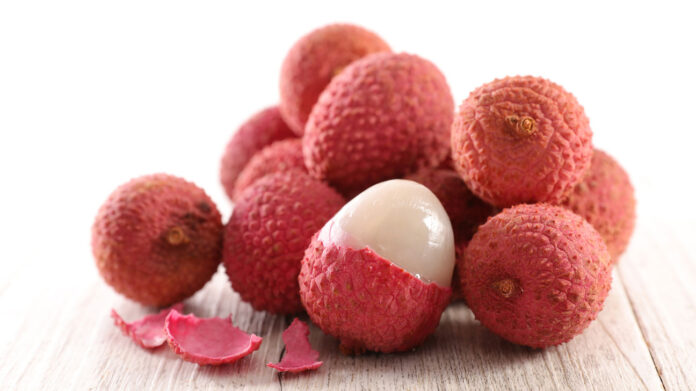The lychee (Litchi chinensis) is a tropical fruit that belongs to the soapberry family, Sapindaceae. It is known for its unique and refreshing taste, featuring a balance of sweetness and a slight floral flavor. The fruit has a rough, reddish outer skin that is not edible, but once peeled, it reveals juicy, translucent white flesh that encases a single, large seed.
Interesting Facts About Lychee:
- Lychee trees are evergreen and can reach up to 40 feet (12 meters) in height. These trees produce clusters of small, round fruits and thrive in warm, subtropical climates with high humidity. Native to southern China, lychees have been cultivated for over 2,000 years and are a staple in Chinese cuisine and traditional festivals. Today, they are widely grown in countries like India, Thailand, Vietnam, and South Africa, and are also popular in parts of the United States, particularly in Florida and Hawaii.
- Ancient Origins: Lychee cultivation dates back over 2,000 years in southern China. It was a luxurious fruit in the imperial courts, treasured by emperors, especially during the Tang Dynasty. The fruit’s exoticism was amplified by the difficulty of transporting it without losing its flavor and freshness
- Nutritional Powerhouse: A single cup of lychee provides more than 100% of your daily vitamin C needs, supporting immune function and skin health. Additionally, lychee’s mineral content includes potassium for heart health and magnesium for muscle function
- Antioxidant Benefits: Lychee contains high levels of polyphenols, such as flavonoids and vitamin C. These antioxidants combat oxidative stress, which may reduce the risk of chronic diseases, including heart disease and cancer
- Low in Calories: Each 100 grams of lychee contains only about 66 calories, making it an ideal snack for those monitoring calorie intake. The fruit is also hydrating, with a high water content that makes it refreshing in hot climates
- Culinary Uses: In Asian cuisines, lychee is often found in desserts, either fresh or in the form of lychee-flavored syrup. It also features in savory dishes, like sweet-and-sour chicken, where it adds a burst of flavor. In beverages, lychee is used in cocktails and bubble tea
- Symbol of Romance: Chinese folklore often highlights lychee as a symbol of love and passion. A famous legend tells of Emperor Xuanzong, who sent horsemen on a long journey to bring fresh lychees to his beloved concubine, Yang Guifei, demonstrating the fruit’s allure and romantic connotations
- “Alligator Strawberry”: This playful nickname for lychee comes from its bumpy, reddish outer skin, reminiscent of an alligator’s hide, and the fruit’s strawberry-like appearance when peeled
- Short Season: The lychee season is brief, usually from May to July, depending on the region. This limited availability makes fresh lychee highly sought-after during the summer months. Efforts to extend the season have included improved farming techniques in countries like Australia
- Lychee Wine: This beverage is particularly popular in Asian countries, where it is enjoyed for its light and floral flavor. Lychee wine pairs well with spicy Asian cuisine or can be sipped on its own as a dessert wine
- Cultural Significance: During Chinese New Year, lychee symbolizes happiness and prosperity. The fruit is often used in rituals and as a gift to bring good fortune in the coming year, reflecting its auspicious status in Chinese culture
- Precious in Ancient Times: In ancient China, lychee was so precious that elaborate courier systems were developed to transport the fruit quickly from southern provinces to the imperial palace in Beijing. This task was a logistical feat, considering the perishable nature of lychee
- Caution in Storage: Lychee is sensitive to temperature and humidity. Proper storage at 90-98% humidity can preserve the fruit for up to five weeks in a refrigerator. Improper storage can cause the skin to turn brown, although the fruit inside remains safe to eat
- Australian Lychees: Australian lychees are lauded for their freshness, natural sweetness, and high quality. Unlike some producers, Australian farmers generally avoid using sulfur dioxide to maintain skin color, emphasizing natural cultivation methods
- Medical Applications: Lychee has been used in traditional Chinese medicine for centuries, credited with cooling properties that help alleviate inflammation, fever, and digestive issues. It is also thought to boost energy and improve skin health
- Unique Aroma: The distinctive fragrance of lychee comes from volatile organic compounds, particularly terpenes and esters. These compounds are also found in various flowers and contribute to the fruit’s perfume-like aroma
- Growing Popularity: Lychee is gaining recognition in Western markets, where it is being incorporated into cocktails, gourmet dishes, and innovative desserts. This growing interest has spurred greater availability and awareness of lychee’s health benefits and culinary versatility
